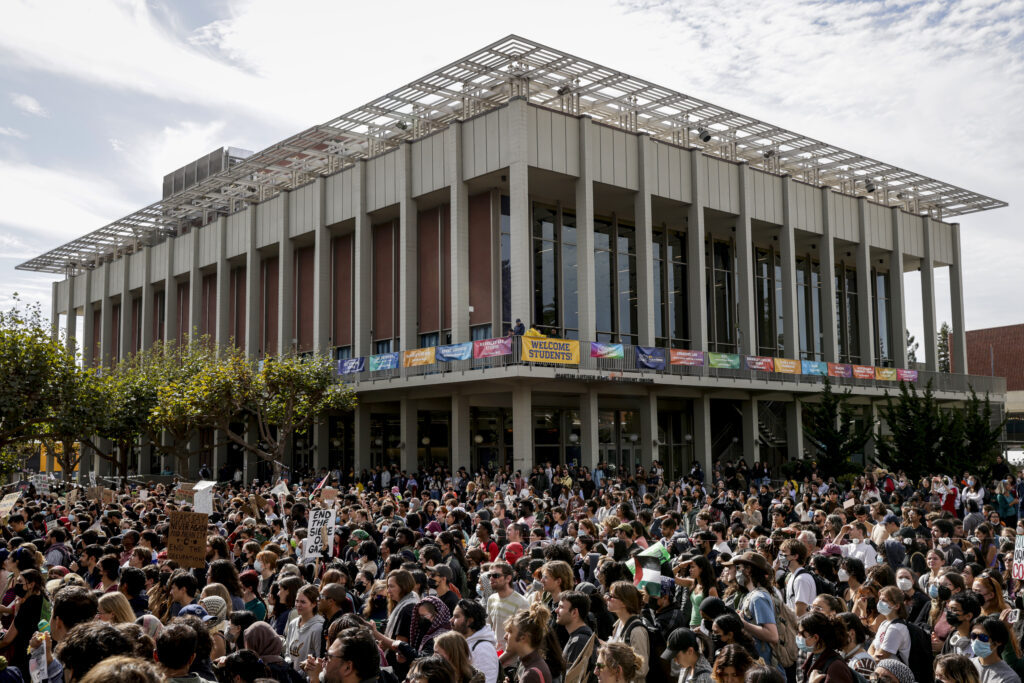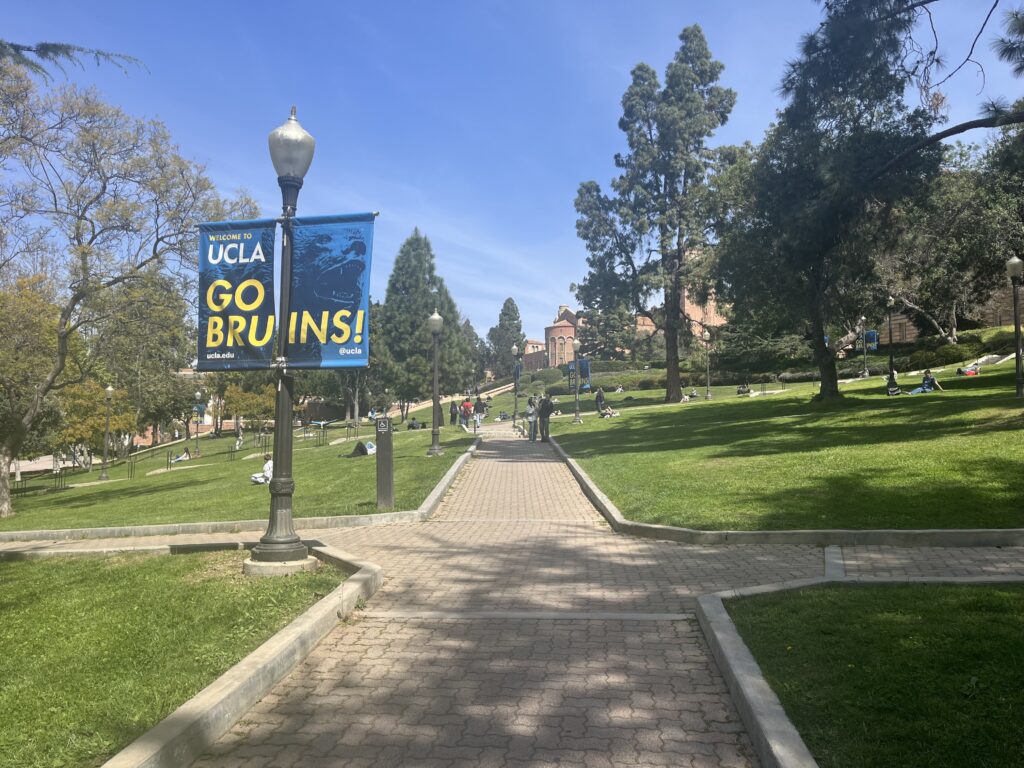
Hundreds of UC Berkeley students walked out of class on Oct. 25, calling for a cease-fire in Gaza. The students are among thousands who have walked out on campuses nationwide as fighting between Israel and Hamas continues in Gaza.
Credit: Brontë Wittpenn/San Francisco Chronicle/Polaris
This story was updated to reflect the UC board’s decision to table a vote on the issue.
University of California faculty and other staff could be banned from publishing political statements, including those stemming from the Israel-Hamas war, on university websites and other university channels under a policy brought to UC’s board of regents.
The consideration of such a policy comes after some units, including at least two ethnic studies departments, posted statements on their websites last fall supporting Palestine and condemning Israel.
The proposal is causing an uproar among some faculty who say it would repress their academic freedom and question how it would be enforced.
UC officials behind the idea say it is necessary to ensure that the opinions of certain individuals or groups of faculty aren’t mistaken for the opinions of UC as a whole.
“When individual or group viewpoints or opinions on matters not directly related to the official business of the unit are posted on these administrative websites, it creates the potential that the statements and opinions will be mistaken as the position of the institution itself,” regent Jay Sures, who helped develop the proposal as chair of the regents’ compliance and audit committee, said during Wednesday’s regents meeting.
The regents won’t vote on the policy until March at the earliest. They initially planned to take action this week but opted to table the vote until their next meeting, scheduled for March 19 through 21, after the item caused much confusion and debate when discussed Wednesday evening.
The effort is the latest fallout from the Oct. 7 attack on Israel by Hamas and Israel’s military response in Gaza, which has triggered sharp responses from pro- and anti-Israel groups.
The policy does not specifically mention any particular issue, but some faculty see it as an attempt to prevent them from discussing the Israeli-Palestinian conflict.
Since the fall, the website for UC Santa Cruz’s critical race and ethnic studies department has displayed a statement calling on “scholars, researchers, organizers, and administrators worldwide” to take action “to end Israel’s genocidal attack on Gaza.” The website for UC San Diego’s ethnic studies department includes several statements and commentaries. One statement says the ethnic studies community at UC San Diego supports Palestinian people and their “freedom from an apartheid system that seeks to dehumanize them in unconscionable ways.”
Sures last fall also sharply criticized a letter by the UC Ethnic Studies Council. In the letter, the council said official UC communications denouncing Hamas for its Oct. 7 attack on Israel distorted and misrepresented “the unfolding genocide of Palestinians in Gaza and thereby contribute to the racist and dehumanizing erasure of Palestinian daily reality.” Sures wrote a public response to the council saying the letter “is rife with falsehoods about Israel and seeks to legitimize and defend the horrific savagery of the Hamas massacre.”
One regent, Hadi Makarechian, acknowledged during Wednesday’s regents meeting that the regents were considering the issue because “some people were making some political statements” related to Palestine and Hamas.
Christine Hong, a professor of critical race and ethnic studies at UC Santa Cruz, said during the public comment portion of the meeting that the regents are attempting to “repress academic freedom” and disallow “any critical study or discussion of Palestine.”
“Your emissary, regent Jay Sures, declared war on ethnic studies,” Hong added.
Sures maintained Wednesday that the policy isn’t meant to impede free speech and that he believes there “are many avenues” for faculty to share their viewpoints.
“I’m not so sure that it needs to go on the landing pages of departmental websites,” he said.
The final language of the policy that the regents could vote on isn’t yet known. According to their agenda, regents were scheduled to vote Wednesday on a policy stating that “official channels of communication, including the main landing pages of websites, of schools, departments, centers, units, and other entities should not be used for purposes of publicly expressing the personal or collective opinions of unit members or of the entity.”
That language was criticized for being too ambiguous, including by two key UC law professors who urged the regents to reject the proposal. The professors — Ty Alper of UC Berkeley and Brian Soucek of UC Davis — each previously served terms as chair of the UC Academic Senate’s university committee on academic freedom. As chairs, they helped develop a 2022 recommendation by the Senate that faculty departments should be allowed to issue opinionated statements.
In a letter to the regents, Alper and Soucek said the proposed policy “raises more questions than it settles.” Do official channels include a department’s social media pages, even though those aren’t UC-hosted websites? Do emails sent by a dean or department chair count as official channels? Are faculty departments violating the policy if they were to sign a public statement hosted on a website not operated by UC?
Acknowledging that the language was indeed ambiguous, UC staff during the meeting amended it and presented two different options to regents. Under the first option, faculty departments would be banned from expressing opinions only on the “main landing pages” of university websites. The second option featured language that would extend the ban beyond the landing pages and to other websites, at the discretion of a university administrator.
But those options also caused confusion and debate among regents and UC officials.
“Even if it’s not on the main landing page, if someone says, this is the official viewpoint of Department X on this political issue, I think you could interpret some of this language to say, we also don’t want people to do that,” Howard Gillman, the chancellor of UC Irvine, said Wednesday while addressing the regents.
Some regents and officials also suggested that the policy include language that university departments should have designated opinion pages on their websites, and that any political statements or other opinions should be limited to existing on those pages.
Sures agreed to work overnight with fellow regent Lark Park and UC’s general counsel, Charles Robinson, to further revise the policy and return Thursday with a new action item. On Thursday, however, the regents agreed to table the item until March following a motion by regent John Pérez.
“Issues of First Amendment protection are crucial to the institution. I am supportive of the concept that we’re trying to get through here. After looking at the product of work that’s come forward, I don’t think we’ve got enough to act on in a meaningful way, in a way that’s defensible to the core mission of the university. I think we would benefit from more input,” Pérez said.
By possibly banning faculty departments from making political statements, UC’s new policy could run counter to the 2022 Academic Senate recommendation, some faculty say. At that time, the Senate’s academic council and university committee on academic freedom agreed that “departments should not be precluded from issuing or endorsing statements in the name of the department,” noting that freedom of expression as well as academic freedom are “core tenets of the UC educational mission.” The Senate took up the issue after UCLA’s Asian American studies department published a statement expressing solidarity with Palestinians and denouncing Israel.
In a social media statement Wednesday, the Berkeley Faculty Association said the idea to ban departments from making political statements was already considered and rejected by the Academic Senate in 2022. The faculty association also questioned how the new policy would be enforced and urged the regents to reject it.
“Who gets to decide what is a political statement and who will be responsible for policing the websites and social media accounts of academic units? We urge the Regents not to approve a dangerously ambiguous policy which raises alarming questions about governance and academic freedom,” the faculty association wrote.


